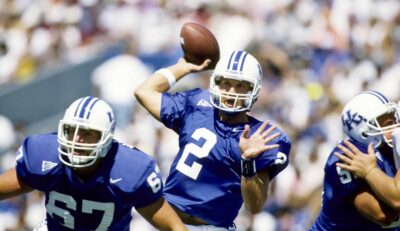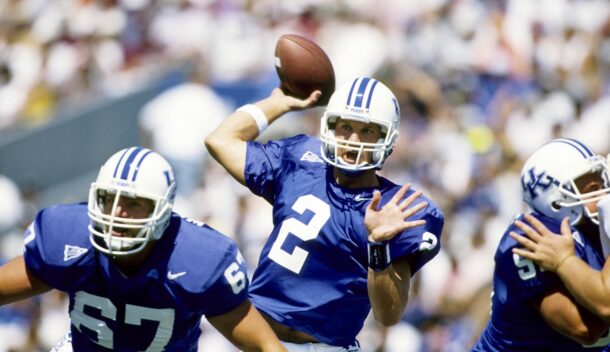
A month ago, The Swamp was back and the Gators were well ahead of the rebuilding schedule after a thrilling upset victory over then No. 5 LSU.
Just a week ago, Florida was 6-1, ranked inside the top 10 and had a real chance to win the SEC East at the Cocktail Party in Jacksonville. Down only six and with Georgia backed up deep in its own territory on a third-and-11 early in the fourth quarter, the Gators were a stop and a score from potentially playing their way into the College Football Playoff conversation.
Even after the fourth quarter collapse and defeat to Georgia, Florida found itself ranked No. 11 in the first batch of Playoff rankings, controlling their destiny to earn a New Year’s Six bowl invitation.
But on Saturday, a glorious autumn day for Homecoming football in Gainesville, the Gators had a chance to bounce back and put what has been a fun season back on the winning track.
Instead, Florida was mauled by Missouri for the second consecutive season, a 38-17 loss that all but eliminates Florida from New Year’s Six conversation and leaves the Gators once again a program with far more questions than answers.
The questions start at quarterback, where Feleipe Franks followed his abysmal performance against Georgia with an even more mind-boggling display of football Saturday.
In just over one half against a Missouri defense that entered the game ranked 123rd nationally in pass defense (worst in SEC) and 126th (worst in the Power 5) in sack rate, Franks was inaccurate, inept at reading simple defenses and wholly ineffective. Before being replaced for Kyle Trask late in the third quarter, Franks was 9-for-22 passing for only 84 yards, an average of just under 4 yards per attempt.
By my count, the number of wide-open throws Franks missed ended at six. He also missed throws despite rarely being pressured or hit, regardless of coach Dan Mullen’s odd postgame argument that “Feleipe was being hit.”
Mullen hinted after the game that the quarterback competition would again be open ahead of Florida’s SEC finale next week against South Carolina. Mullen wouldn’t have put Kyle Trask in to finish the game otherwise, he told the media after game.
“What we were doing wasn’t working,” Mullen said. “What we were doing wasn’t working, right, and the definition of insanity is to keep doing the same thing over and over and hoping it works.”
Florida fans have reason to be skeptical. They have heard the “open competition” lingo before, and it usually ends with another start for Feleipe Franks.
That’s fine if Franks gives Florida its best chance to go 9-3, which would be a terrific mark for Florida under a first-year regime that’s coming off a four-win 2017.
The problem is deep into this season, it’s becoming more difficult to imagine Franks as the player who gives Florida the best chance to win every Saturday.
Barry Odom’s Missouri defense was determined to take away the one thing Franks has done well this season: complete short passes and let his receivers make plays. Missouri brought press coverages and stayed at home on Florida’s swings and screens, daring Franks to complete intermediate and vertical throws down the field. Franks couldn’t, and often, his throws weren’t close.
Forget for a moment that Kyle Trask moved the offense better than Franks in limited action. If Trask had been better than Franks this season in practice, he would have played. But with Franks continuing to be Florida’s best option, that means the Gators have a limited ceiling for growth as a team and program under Dan Mullen.
As good a play-caller and offensive schemer Mullen is, there’s only so many ways to cover up Franks’s various deficiencies. It’s a familiar and tiring refrain in Gainesville but it’s one that three years into Franks’s career rings true: until Florida finds a more capable player at quarterback, the program’s efforts to chase Georgia and Alabama will be mostly futile.
It wasn’t just Franks on Saturday.
The Gators defense, once the elite heartbeat of this program, was terrible Saturday and has been woefully inadequate over the past two Saturdays.
In a five-quarter span covering Florida’s second half against Georgia and the first three quarters against Missouri, Florida’s defense managed one sterling goal-line stand but otherwise surrendered over 600 yards of offense and 58 points. Those numbers are very bad, regardless of who plays quarterback, and Florida won’t be elite again until the Gators defense is the sleek, feared unit of reputation again.
Epic goal-line stands are nice for end-of-year highlight videos, but three-and-outs are better. Florida didn’t get enough Saturday.
The Gators were especially horrid on third down, allowing Mizzou to finish 11 of 18 on third downs.
Florida’s secondary should have been better Saturday given the return of midseason consensus All-American Brad Stewart and All-SEC caliber corner C.J. Henderson. Henderson played well, but Stewart blew a coverage on a second-half touchdown and was part of a back end of the Gators secondary victimized by Missouri quarterback Drew Lock all afternoon.
Lock entered the game with only one touchdown pass against five interceptions in four SEC games. He left with his first win over a ranked opponent and likely the most efficient SEC performances of his career, one that saw him connect on 24 of 32 passes for 250 yards and three touchdowns.
Florida’s vaunted pass rush was nowhere to be found — the Gators recorded zero sacks and have only two in the prior three games. Florida also did not force a turnover — and after an opportunistic start to the year that saw Florida force 18 turnovers in six games, Florida has forced just one in their past three contests.
All told, Florida’s failings at quarterback and on defense allowed them to be run out of their home building by a Missouri team that, while statistically better than their 4-4 record, shouldn’t be winning by three scores in The Swamp. Over the last two seasons, a Missouri team that has struggled to win league games has outscored Florida 80-33.
This Mizzou team isn’t a great matchup for Florida, as we wrote last Monday, but as good a job as Missouri has done to prepare, that type of disparity should embarrass the Gators. It certainly embarrassed their fans, many of whom filed for the exits when the team fell behind 35-10 in the third quarter.
The Gators talked a great deal this summer about Mizzou, with Cece Jefferson even mocking Missouri’s home field advantage at SEC Media Days. The Gators also talked this week about responding to the Georgia loss the right way and finishing the year strong for the seniors and the new coaching staff.
Florida’s players certainly talk a big game, but talk is cheap when a program hasn’t fully embraced the process of winning.
“Being a champion,” as Dan Mullen said after the game, “isn’t an every now and then thing.”
Florida will have another chance to get back to playing to what Dan Mullen calls “the Gator standard” in a week, one of three final chances in this regular season. It is, as Nick De La Torre wrote at Gator Country, “gut check time” in Gainesville.
Florida will need to do more than talk about playing hard and winning or they’ll squander those chances, and a once-fast-moving Mullen rebuild will find itself suddenly stuck in neutral, remaining there until Florida commits to consistency in all phases of its operation.
Neil Blackmon covers Florida football and the SEC for SaturdayDownSouth.com. An attorney, he is also a member of the Football and Basketball Writers Associations of America. He also coaches basketball.







